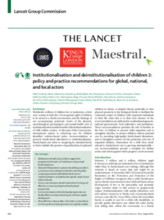Summary
Worldwide, millions of children live in institutions, which runs counter to both the UN-recognised right of children to be raised in a family environment, and the findings of our accompanying systematic review of the physical, neurobiological, psychological, and mental health costs of institutionalisation and the benefits of deinstitutionalisation of child welfare systems. In this part of the Commission, international experts in reforming care for children identified evidence-based policy recommendations to promote family-based alternatives to institutionalisation. Family-based care refers to caregiving by extended family or foster, kafalah (the practice of guardianship of orphaned children in Islam), or adoptive family, preferably in close physical proximity to the biological family to facilitate the continued contact of children with important individuals in their life when this is in their best interest. 14 key recommendations are addressed to multinational agencies, national governments, local authorities, and institutions. These recommendations prioritise the role of families in the lives of children to prevent child separation and to strengthen families, to protect children without parental care by providing high-quality family-based alternatives, and to strengthen systems for the protection and care of separated children. Momentum for a shift from instit- utional to family-based care is growing internationally— our recommendations provide a template for further action and criteria against which progress can be assessed.
This paper is the second part in the Lancet Group Commission on the institutionalisation and deinstitutionalisation of children.
Related:
- Institutionalisation and deinstitutionalisation of children: the Executive Summary from a Lancet Group Commission
- Institutionalisation and deinstitutionalisation of children 1: a systematic and integrative review of evidence regarding effects on development
- Prevalence and number of children living in institutional care: global, regional, and country estimates
- Global prevalence of institutional care for children: a call for change

